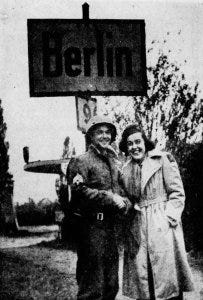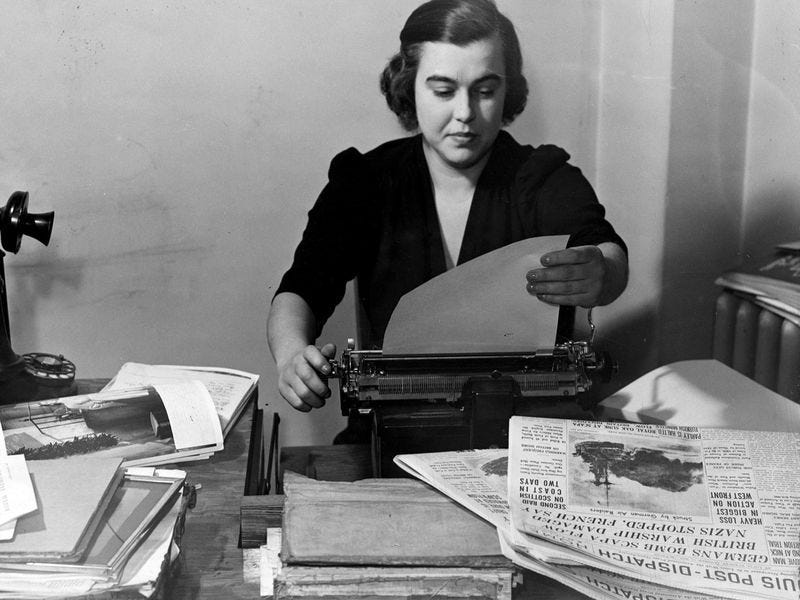Virginia Irwin's dash to Berlin
As Gen. Dwight D. Eisenhower's troops plowed into Germany in the spring of 1945, the supreme commander made it clear that Berlin was not an objective for the Western Allies. The prize of capturing the seat of Nazi power would go to the Russians, symbolism and public relations value be damned.
While U.S. and British troops had no choice but to acquiesce, a handful of war correspondents found the temptation irresistible. As the pincers closed on German forces with the linkup of U.S. and Russian forces at Torgau on the Elbe on April 25, a couple of American correspondents decided to make a run for the ultimate dateline: Berlin.
Though first contact between the Allied forces came on the 25th, it wasn't until the following day that a full complement of U.S. and Russian officers got together in the city, about 80 miles south of Berlin. On the 27th, the full weight of the Allied press corps bore down on the Elbe, complete with a photographer-ready reenactment of the handshake between 2nd Lt. William Robertson of the 69th Infantry Division and Russian Lt. Alexander Sylvashko.
The assembled media had lunch on the 27th with the 69th's commander, Maj. Gen. Emil Reinhardt, along with V Corps commander Gen. Clarence Huebner and two Russian generals. After the meal, war correspondents Virginia Irwin of the St. Louis Post-Dispatch and Andrew Tully of the Boston Traveler headed north in a jeep, with Sgt. Johnny Wilson of the 26th Infantry at the wheel, on what Irwin would describe as "the strangest journey I have ever undertaken."
None of us understood Russian. German road signs had been removed and replaced with their Russian equivalent. We got to Berlin on the strength of a crude hand-made American flag flying from our jeep, several hundred handshakes and repeated assurances to fierce Russians who repeatedly stopped us that we were 'Amerikanski!' And everywhere, as soon as we had convinced the Russians of our identity, we were mobbed.
By 8 p.m. on the 27th, the trio had successfully navigated to the capital, its citizens cowed by the enemy marauding through the city. Irwin, a 36-year-old former features writer, sketched out scenes of dead Germans scattered on suburban lawns and Russian troops on horseback running wild through the streets.
The Russians were happy -- with almost indescribable wild joy. They were in Berlin. In this German capital lies their true revenge for Leningrad and Stalingrad, for Sevastopol and Moscow.
Though fighting still raged in parts of the city, Irwin, Tully and Wilson soon found themselves guests at the command post of Guards Major Nikolai Kovaleski. Upon their arrival, a "Cossack orderly, a fierce Mongolian with a great scar on his left cheek," produced a dishpan of water Irwin could use to freshen up -- followed soon after by Kovaleski presenting her with German face powder and perfume and a cracked mirror.
I made myself as presentable as possible and sat down to a candlelit, flower-bedecked dinner table. The candelabra was upturned milk bottles and the flower vase was an old pickle jar, but the dinner was served with all the formality of a State function in Washington.
A feast followed, beginning with "huge platefuls of something that tasted like spiced salmon." And there was vodka, of course, consumed in tumblers, and at length.
Among the numerous toasts served up that evening were homages to the three correspondents ("Capt. Veergeenee Erween") and even their jeep. Over and over in her account, Irwin emphasizes the bizarre nature of the scenes unfolding before her eyes.
As we drank our toasts the battle of Berlin raged only a few blocks away. As the artillery roared, the house shook and the candles fluttered. The candles are still fluttering as I write this story, this story of the most exciting thing that could ever happen to a newspaper reporter. It is all unreal.
After the dinner, there was dancing, with Irwin of course the prized partner. "One young captain was the Russian equivalent of the American jitterbug and danced, not only with me, but with Johnny. I am still puffing with exertion."
The Americans finally begged off from further festivities around 1 a.m. and crashed, only to wake up in the morning and resume their explorations. But only after a hearty breakfast of "charred veal and potatoes swimming in fat -- all washed down with alternate drinks of hot milk and vodka."
"We are the only three Americans here, and even the Russians think we are slightly mad," Irwin would acknowledge early in her April 28 dispatch.
Morning reinforced the notion that the battle wasn't quite won, as the trio made repeated attempts to get to the Unter den Linden but finally acknowledged that to do so would amount to a suicide mission as fighting still raged.
The whole day was like being transported to another and strange world. I felt as though I had been caught in a giant whirlpool of destruction. There was such an air of unreality about the whole of the battle for Berlin that I thought at times I had lost my reason and was only imagining these strange and unearthly sights.
With the sun beginning to set on the 28th, the correspondents decided it was time to head back to friendlier turf. They motored back the way they had come, toward the Elbe, but upon arrival were refused passage by Russian troops.
As Irwin later recounted in a St. Louis speaking engagement, she stood on the east bank of the Elbe and yelled to the U.S. troops across the way, "I'm American woman, come get me away from these Russians!" Before long, two assault boats made the crossing to retrieve Irwin and her fellow travelers.
Once Irwin and Tully returned to their Army public relations office minders, there was hell to pay for the freelance excursion. Censors refused to clear their dispatches, leaving them to sit idle while the days to German surrender ticked by.
It wasn't until May 8 -- V-E Day -- that the first of Irwin's reports appeared in the Post-Dispatch. Not as timely as it could have been, of course, but it still bore a most enviable dateline: "BERLIN, Germany, April 27".
Her reports from Berlin featured prominently on the front page the next two days as well. The last of those concluded on page 3 near a separate story, this an Associated Press report from Paris announcing that Irwin and Tully had been disaccredited by SHAEF for their unauthorized trip to Berlin.
Irwin wasted no words in ripping SHAEF's move, calling the experience since her return "the greatest exhibition of bungling I ever saw in my life. They treat you as if you were a half-witted child."
Tully wrote in the Traveler in mid-June that he and Irwin "could not possibly have known anything about the ban" on travel to Berlin, since it was put in place after the pair had already departed Torgau. "If the Army can prove me wrong on a single point, I'll eat Brig. Gen. Hank Allen's tin hat for breakfast."
As part of the discipline, both correspondents were booted from the theater effective immediately -- though by this point the European war was over. Irwin and Tully departed Southampton, England, on May 24 aboard the SS Monticello along with a host of other battle-weary correspondents. They arrived in New York on June 3.
It would take a while, but they would eventually get back in the Army's good graces. On May 20, 1947, Irwin received a certificate from the War Department expressing its appreciation for her "conspicuous service as an accredited war correspondent serving with our armed forces in an overseas theater of combat." Other correspondents had received similar certificates in 1945.
That official recognition from on high was validation for Irwin, though her work had stood on its own since publication. Beyond the Post-Dispatch's heroic presentation of her delayed copy from Berlin, dozens of newspapers nationwide gave Irwin's stories prominent play -- albeit with the condescending tone of the era.
Irwin continued to write for the Post-Dispatch until her retirement in 1963, serving for a time as the paper's New York correspondent. She also wrote an advice column under a pseudonym for a while, reportedly much to her displeasure.
She died in 1980 at age 72.








